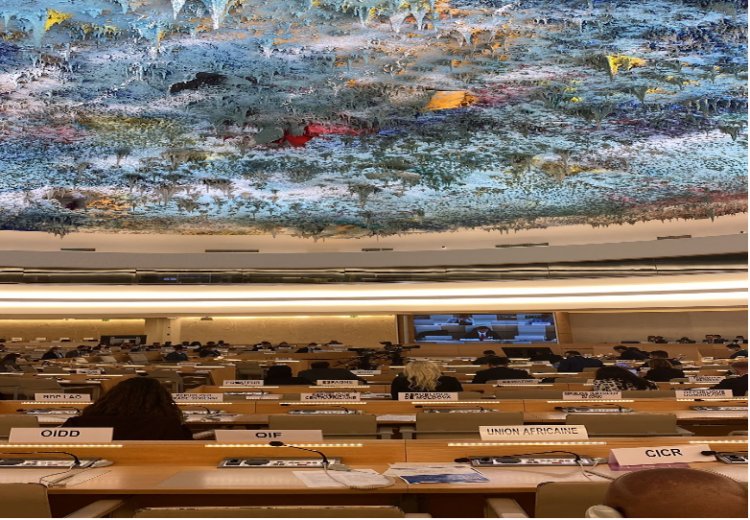HRC Session IE on International Order

19/09/22
Written by: GHRD Delegates
1.- Presentation of Fifth Thematic Report to the Human Rights Council by Independent Expert Livingstone Sewanyana
At a time when the international community is experiencing global challenges, including climate change, the COVID-19 Pandemic, and the unlawful Russian invasion of Ukraine, the Independent Expert on the promotion of a democratic and equitable international order, Livingstone Sewanyana, presented his fifth thematic report (A/HRC/51/32) to the 51st Session of the Human Rights Council. The report focuses on the main challenges threatening the maintenance and strengthening of international peace and security at the global level. As one of the fundamental purposes of the United Nations, as stipulated in Article 1 of the Charter of the United Nations, maintaining international peace and security is crucial to foster a democratic and equitable international order and assuring all people of the Right to Peace. Therefore, it is a shared responsibility of all States to address threats to international peace and security multilaterally.
The critical issues on which the report focuses are:
- (a) the centrality of international law and peace in safeguarding international order, for which the full and unconditional respect of international human rights and humanitarian law emerges as the condition sine qua non for achieving justice resilient international order. The need to uphold a culture of peace is the primary purpose of the UN, and it should be promoted and respected by every country by settling international disputes with peaceful means and avoiding the use of force.
- In this regard, (b) a new impetus for global disarmament, particularly nuclear disarmament, considered a significant threat of the 21st century, is fundamental. Furthermore, states are called upon to reduce military spending to reinvest them in sustainable development.
- Addressing the challenges to strengthen international order, (c) structural reform of some key United Nations bodies is deemed necessary. In particular, the UN Security Council should become a democratic representative, effective, transparent, and accountable body.
Currently, the geopolitical reality of UN membership is not represented in the Council, while the veto power of permanent members blocks its functioning.
The General Assembly should be revitalised to exercise a more significant role in decision-making. At the same time, the Peacebuilding Commission and the Peacebuilding Fund should focus on pressing matters such as climate change, human rights, and security. Finally, reinforcing the mandate and the jurisdiction of the International Court of Justice appears crucial in light of the rent conflict in Ukraine.
2.- Following Session and discussion of the findings of the report
During the Session, most of the state representatives expressed their willingness to improve the international order and promote the development of all countries. Concerning international democratic order, human rights law, and humanitarian law, member states and the Council have positive obligations to support peacebuilding and coexistence at the international level. However, most states have some common challenges regarding the international order that need to be addressed. For example, climate change is often regarded as a national security issue, especially for many archipelagic or coastal countries, requiring international cooperation. Some developing countries also face serious challenges, such as food and energy crises, which are also related to climate change and natural disasters. In addition, torture and degrading treatment, arbitrary detention, and other human rights violations still exist in some countries, which should be dealt with from both domestic and international levels.
The states should promote and improve the framework of the international human rights system, which has already been established and requires total compliance. All member states should fully respect the international order and the protection of human rights in the decision-making process based on consent and the protection of multilateralism. Most states also agree that the HRC is obligated to protect individuals of vulnerable groups, regions in conflict, developing countries, and countries with serious human rights violations. For some developing countries, finding a balance between development and peace is significant, the coexistence of human rights protection, economic growth, and national stability. The importance of dialogues to build trust and the genuine effort of equality of nations are also emphasized during the Session. It is significant for the international community to promote the control of nuclear weapons, and negotiation should be the advocated means for the international community instead of force and violence.
Several states also welcomed the proposed reformation of UN institutions, namely the Security Council. In their view, this would contribute to maintaining international peace, unconditional respect for international law, and realizing a peaceful and just international order.
Nevertheless, some dissident voices critiqued the findings of the Independent Expert, the Russian delegation one of them. Russia categorically rejected several conclusions of the report, focusing mainly on two issues. First, the Russian delegation was against the characterization of the war against Ukraine. In its view, the conflict was the coup d'etat supported by nationalist Ukrainian forces and the civil war that followed. Second, the Russian delegation considered that the Independent Expert Sewanyana went beyond his mandate when suggesting the reform of United Nations bodies, such as the Security Council.
In response to the latter concern, the Independent Expert reminded us that multilateral cooperation is crucial for sustainable development and the sustenance of humanity. He continued to say that the UN Charter was adopted as a framework for international peace and security and requires total compliance. When States deviate from their requirements, they cause a threat to international order. To the concerns raised by the Russian delegation, he replied that article 14 of the UN Resolution clearly states that the question of human rights, democracy, the rule of law, and peace and security is within his mandate. Therefore, the issue raised concerning the reformation of the Security Council was in line with his mandate. Finally, he invited the Russian delegation to consider his report's recommendations in good faith.




 GHRTV Author
GHRTV Author 




























